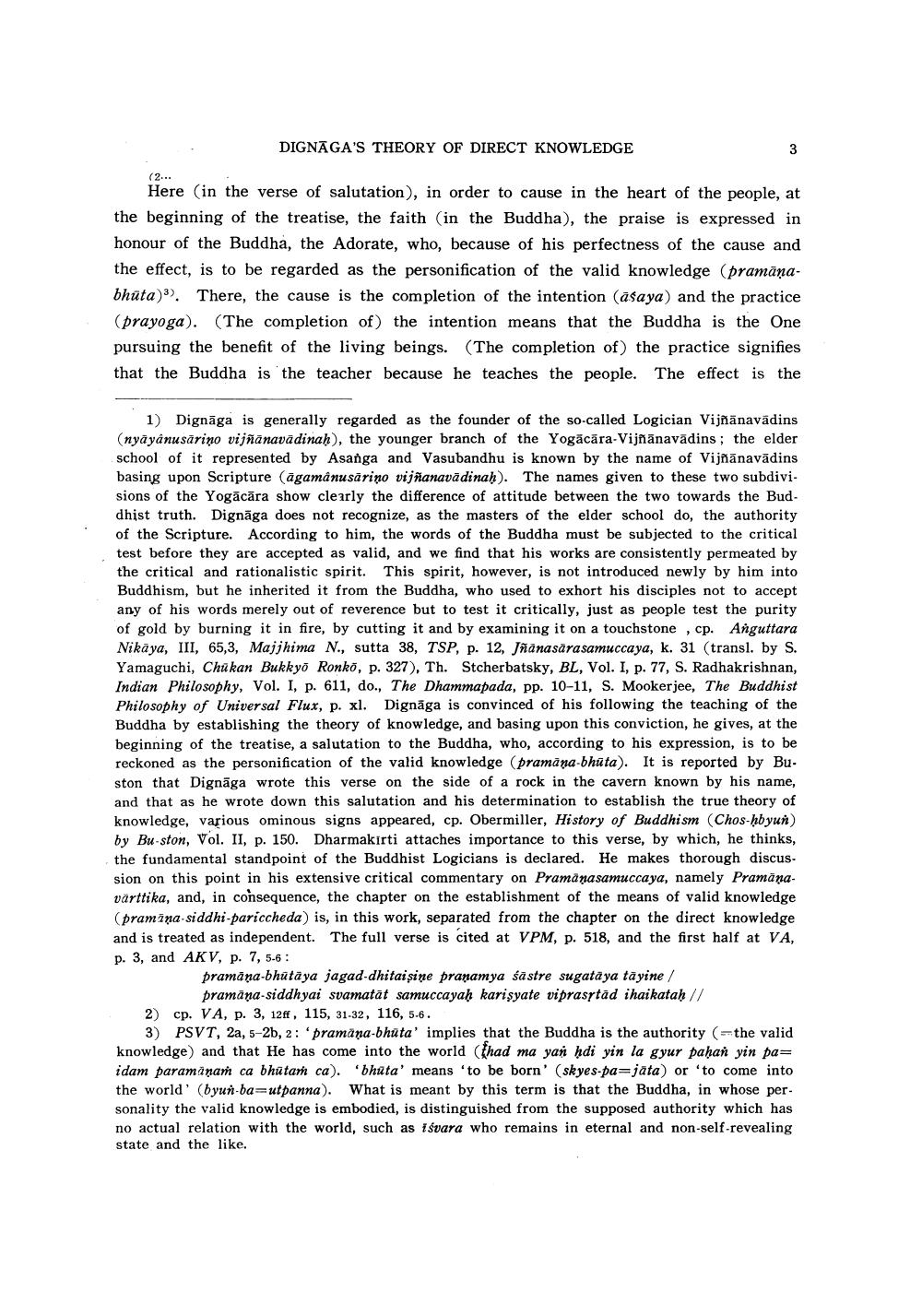Book Title: Dignagas Theory Of Direct Knowledge Author(s): Massaki Hattori Publisher: Massaki Hattori View full book textPage 3
________________ DIGNAGA'S THEORY OF DIRECT KNOWLEDGE (2... Here (in the verse of salutation), in order to cause in the heart of the people, at the beginning of the treatise, the faith in the Buddha), the praise is expressed in honour of the Buddha, the Adorate, who, because of his perfectness of the cause and the effect, is to be regarded as the personification of the valid knowledge (pramanabhuta)). There, the cause is the completion of the intention (asaya) and the practice (prayoga). (The completion of) the intention means that the Buddha is the One pursuing the benefit of the living beings. (The completion of) the practice signifies that the Buddha is the teacher because he teaches the people. The effect is the 1) Dignaga is generally regarded as the founder of the so-called Logician Vijnanavadins (nyayanusarino vijnanavadinah), the younger branch of the Yogacara-Vijnanavadins; the elder school of it represented by Asanga and Vasubandhu is known by the name of Vijnanavadins basing upon Scripture (agamanusarino vijnanavadinah). The names given to these two subdivisions of the Yogacara show clearly the difference of attitude between the two towards the Buddhist truth. Dignaga does not recognize, as the masters of the elder school do, the authority of the Scripture. According to him, the words of the Buddha must be subjected to the critical test before they are accepted as valid, and we find that his works are consistently permeated by the critical and rationalistic spirit. This spirit, however, is not introduced newly by him into Buddhism, but he inherited it from the Buddha, who used to exhort his disciples not to accept any of his words merely out of reverence but to test it critically, just as people test the purity of gold by burning it in fire, by cutting it and by examining it on a touchstone , cp. Anguttara Nikaya, III, 65,3, Majjhima N., sutta 38, TSP, p. 12, Jnanasarasamuccaya, k. 31 (transl. by S. Yamaguchi, Chukan Bukkyo Ronko, p. 327), Th. Stcherbatsky, BL, Vol. I, p. 77, S. Radhakrishnan, Indian Philosophy, Vol. I, p. 611, do., The Dhammapada, pp. 10-11, S. Mookerjee, The Buddhist Philosophy of Universal Flux, p. xl. Dignaga is convinced of his following the teaching of the Buddha by establishing the theory of knowledge, and basing upon this conviction, he gives, at the beginning of the treatise, a salutation to the Buddha, who, according to his expression, is to be reckoned as the personification of the valid knowledge (pramana-bhuta). It is reported by Bu. ston that Dignaga wrote this verse on the side of a rock in the cavern known by his name, and that as he wrote down this salutation and his determination to establish the true theory of knowledge, various ominous signs appeared, cp. Obermiller, History of Buddhism (Chos-hbyun) by Bu-ston, Vol. II, p. 150. Dharmakirti attaches importance to this verse, by which, he thinks, the fundamental standpoint of the Buddhist Logicians is declared. He makes thorough discussion on this point in his extensive critical commentary on Pramanasamuccaya, namely Pramana. varttika, and, in consequence, the chapter on the establishment of the means of valid knowledge (pramana-siddhi-pariccheda) is, in this work, separated from the chapter on the direct knowledge and is treated as independent. The full verse is cited at VPM, p. 518, and the first half at VA, p. 3, and AKV, p. 7, 5.6: pramana-bhutaya jagad-dhitai sine pranamya sastre sugataya tayine / pramana-siddhyai svamatat samuccayah karisyate viprasitad ihaikatah // 2) cp. VA, p. 3, 12ff, 115, 31-32, 116, 5.6. 3) PSVT, 2a, 5-2b, 2: 'pramana-bhuta' implies that the Buddha is the authority (=the valid knowledge) and that He has come into the world (thad ma yan hdi yin la gyur pahan yin pa= idam paramanam ca bhutan ca). 'bhuta' means 'to be born' (skyes-pa=jata) or 'to come into the world' (byun-ba=utpanna). What is meant by this term is that the Buddha, in whose per sonality the valid knowledge is embodied, is distinguished from the supposed authority which has no actual relation with the world, such as isvara who remains in eternal and non-self-revealing state and the like.Page Navigation
1 2 3 4 5 6 7 8 9 10 11 12 13 14 15 16 17 18 19 20
